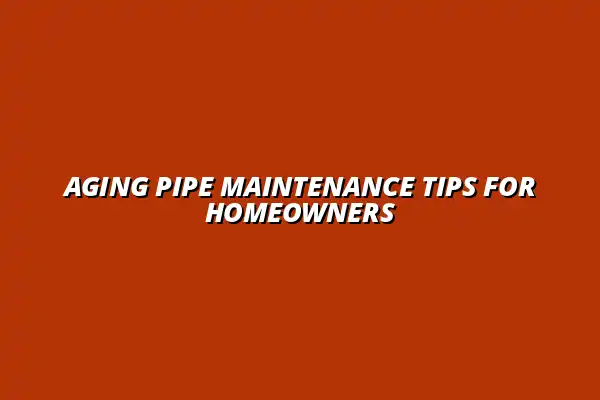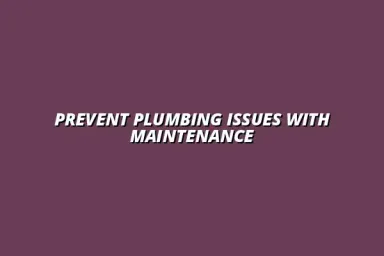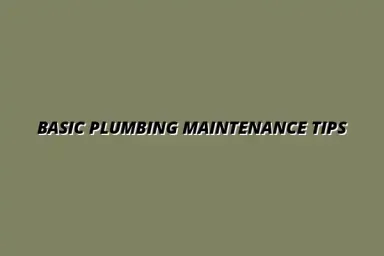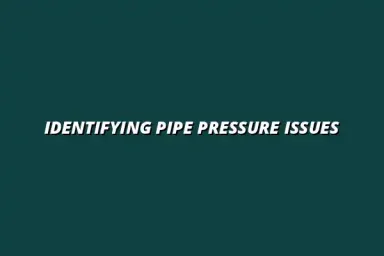Understanding the Importance of Pipe Maintenance for Homeowners
Maintaining your home’s plumbing system is crucial for avoiding costly repairs and ensuring a safe living environment. Over time, pipes can wear down due to various factors like age, water quality, and environmental conditions. Recognizing the importance of pipe maintenance is essential for every homeowner seeking to protect their investment and home comfort. For helpful plumbing maintenance tips specifically for homeowners, check out these plumbing maintenance tips.
One of the first steps in maintaining your pipes is to be aware of their condition. This means understanding how to spot signs of wear and tear before they lead to larger issues. By keeping an eye on your plumbing, you can save yourself from unexpected expenses and the stress that comes with major plumbing repairs!
Recognizing the Signs of Aging Pipes
Homeowners should familiarize themselves with the common symptoms that indicate their pipes may be deteriorating. Some of the most noticeable signs include:
- Frequent leaks or drips
- Low water pressure
- Discolored or foul-smelling water
- Unusual noises from pipes
Addressing these symptoms early can make a significant difference in the overall health of your plumbing system. Remember, the sooner you act, the less severe the consequences! For example, understanding the connection between old pipes and water pressure issues is crucial.
Common Symptoms of Pipe Deterioration
Age and wear can manifest in various ways. Some common symptoms include:
- Rusty or corroded pipes that may lead to leaks.
- Unexplained damp spots on walls or ceilings, indicating hidden leaks.
- Water pooling in areas where it shouldn’t, which may signal a broken pipe.
By paying attention to these signs, you can take steps to address potential issues before they escalate into serious problems. Regular water pipe cleaning can also help prevent issues.
Why Early Detection is Critical
Early detection of pipe issues can save homeowners a lot of stress and money. Addressing problems while they are small helps prevent larger repairs that could involve tearing up walls or floors. Plus, it minimizes the risk of health hazards associated with mold and mildew resulting from leaks.
Additionally, early intervention can lead to improved water quality and pressure, contributing to a more efficient plumbing system. So, it’s always better to be safe than sorry! For comprehensive home plumbing maintenance, see these essential plumbing maintenance tips.
The Consequences of Neglecting Pipe Maintenance
Neglecting the maintenance of your pipes can lead to a host of problems that impact both your health and finances. It’s crucial to understand these consequences to motivate timely action.
Without regular inspections and maintenance, minor issues can quickly escalate into significant plumbing failures. This can disrupt your daily life and leave you scrambling for solutions!
Potential Health Risks from Deteriorating Pipes
Deteriorating pipes can pose serious health risks to you and your family. Some of the health concerns include:
- Exposure to lead from old pipe materials
- Waterborne illnesses due to bacteria growth in stagnant water
- Mold growth from leaks, leading to respiratory issues
By maintaining your pipe system, you can ensure that your home remains a safe haven for your loved ones. Regular maintenance of your bathroom plumbing is also vital; find helpful tips here.
Financial Impacts of Pipe Failures
The financial impacts of neglected pipes are often significant. Homeowners may face:
- High repair costs for emergency plumbing services
- Increased water bills due to leaks
- Potential property damage requiring extensive renovations
Investing in regular maintenance can help avoid these costs and keep your plumbing in good shape. Annual water heater inspections are also important; learn more with these inspection tips.
Frequently Asked Questions About Pipe Maintenance
When it comes to maintaining pipes, many homeowners have questions. Understanding common concerns can help you take better care of your plumbing. Here, we’ll address some frequently asked questions to help clarify important aspects of pipe maintenance.
What Are the Most Common Causes of Pipe Damage?
Pipes can experience damage due to a variety of factors. Knowing these causes can help you prevent issues before they become serious. Here are some of the most common causes:
- Corrosion: Over time, pipes can rust, especially if they are made from metal.
- Tree Roots: Roots can invade underground pipes, leading to blockages or breaks.
- Temperature Changes: Extreme heat or cold can cause pipes to expand or contract, leading to cracks.
- High Water Pressure: Excessive pressure can stress pipes and lead to leaks.
- Improper Installation: If pipes are installed incorrectly, they can wear out faster.
Understanding these causes enables homeowners to be proactive in guarding their pipes against damage. If you need a plumber in Billesley, Birmingham, you can find one here.
How Can Homeowners Identify Aging Pipes?
Identifying aging pipes early is crucial for effective maintenance. There are several telltale signs that can indicate your pipes are nearing the end of their lifespan:
- Discoloration of Water: If your water looks brown or rusty, it may be a sign of pipe deterioration.
- Frequent Leaks: Regularly having to fix leaks can signal that your pipes are aging.
- Low Water Pressure: This may indicate blockages or damage within the pipes.
- Unpleasant Odors: Foul smells coming from faucets or drains could suggest pipe problems.
- Age of the Pipes: If your home is over 50 years old, you might want to consider an inspection.
By keeping an eye out for these signs, you can act quickly to avoid bigger problems down the line!
Practical Steps for Long-Term Pipe Care
Maintaining your pipes doesn’t have to be a daunting task. With a few practical steps, you can ensure their longevity and functionality. Here are some effective ways to keep your pipes in shape:
Creating a Maintenance Schedule for Homeowners
Establishing a maintenance schedule is key to caring for your pipes. Regular check-ups can help you detect issues before they escalate. Here’s how to get started:
- Monthly Checks: Inspect visible pipes for leaks or wear.
- Seasonal Maintenance: Check insulation before winter and clean drains each season.
- Annual Inspections: Consider hiring a professional to inspect your plumbing system yearly.
Using tools and resources can help you keep track of your maintenance schedule effectively.
Tools and Resources for Tracking Pipe Maintenance
To make tracking your pipe maintenance easier, consider the following tools and resources:
- Plumbing Checklists: Create or find checklists online to stay organized.
- Home Maintenance Apps: Use apps to set reminders for inspections and maintenance tasks.
- Journals: Keep a written log of any maintenance work or issues encountered.
These tools can help streamline your maintenance efforts and ensure nothing gets overlooked.
When to Call a Professional Plumber
While DIY maintenance is important, there are times when you should consult a professional:
- Major Repairs: If you encounter significant leaks or breaks, call a plumber immediately.
- Complex Issues: Problems like root intrusions or severe corrosion often require expert help.
- Uncertain Diagnoses: If you’re unsure about what to do, it’s always best to consult a pro.
Remember, it’s better to be safe than sorry when it comes to your plumbing!
Building Awareness for Neighborhood Pipe Care
Pipe maintenance isn't just an individual effort; it's a community concern. By raising awareness and sharing knowledge with neighbors, we can improve the overall health of our plumbing systems.
The Role of Community in Pipe Maintenance
Communities can play an important role in pipe care. Here’s how:
- Neighborhood Workshops: Host sessions to educate residents on pipe maintenance.
- Shared Resources: Pool together tools or services for pipe inspections.
- Community Alerts: Notify neighbors about any plumbing issues or service disruptions.
By working together, we can create a safer and more efficient environment for everyone!
Sharing Resources and Knowledge Among Neighbors
Don’t underestimate the power of sharing information. Here are some ways to inform your community:
- Online Forums: Use social media or neighborhood apps to discuss plumbing tips.
- Neighborhood Newsletters: Include plumbing tips or reminders in community newsletters.
- Local Initiatives: Start or join local initiatives focused on home maintenance education.
When everyone is informed, we all benefit from fewer plumbing problems!
Final Thoughts on Maintaining Aging Pipes
Maintaining your aging pipes doesn’t have to be overwhelming. With a little knowledge and proactive behavior, you can extend their life and ensure a safe home. Here are some key takeaways:
Summarizing Key Maintenance Takeaways
To keep your pipes healthy, remember to:
- Regularly inspect for signs of aging.
- Create a maintenance schedule and stick to it.
- Utilize community resources for better plumbing care.
These simple actions can go a long way in preserving the integrity of your plumbing system.
Encouraging Proactive Measures for Homeowners
Being proactive about pipe maintenance is essential. Don’t wait for a problem to arise before taking action! Here are a few encouraging tips:
- Stay informed about your home’s plumbing system.
- Engage with your neighbors for shared maintenance efforts.
- Invest in regular professional inspections when necessary.
By staying vigilant, you can enjoy a worry-free plumbing experience! Remember, a little effort now can save a lot of trouble later.

 Kiran Almasi
Kiran Almasi

